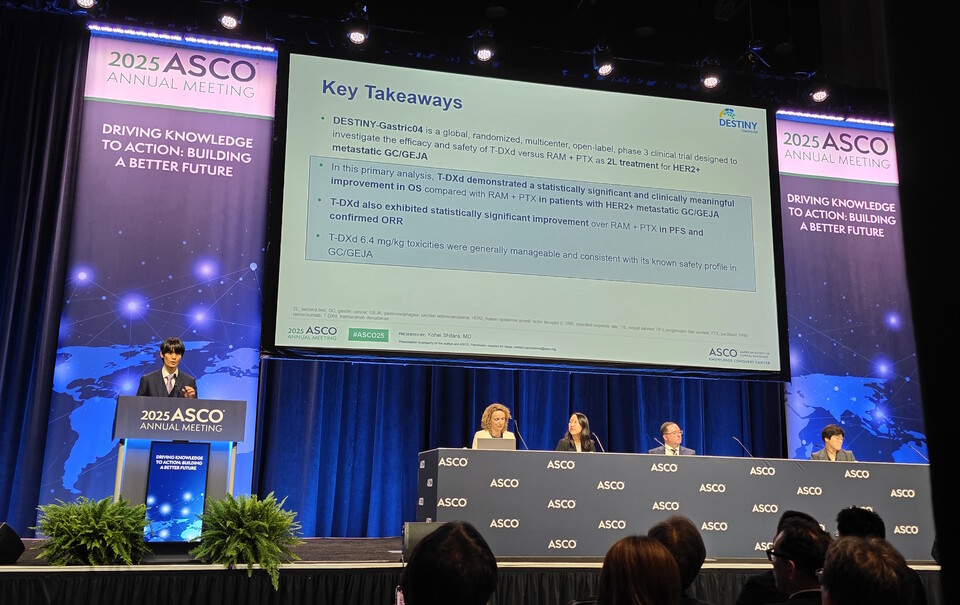
CHICAGO, Ill.--By Kim Yun-mi/Korea Biomedical Review correspondent--Enhertu (trastuzumab deruxtecan) has demonstrated remarkable results in patients with HER2-positive advanced gastric cancer.
Results from the phase 3 DESTINY-Gastric04 study, presented at the American Society of Clinical Oncology 2025 Annual Meeting (ASCO 2025), showed that Enhertu extended survival by about three months compared to the conventional paclitaxel plus ramucirumab combination.
This is the first phase 3 trial to demonstrate a survival benefit over the traditional paclitaxel plus ramucirumab combination in second-line treatment with an agent directly targeting HER2.
The DESTINY-Gastric04 study compared Emhertu with the combination of paclitaxel + ramucirumab in 494 patients with unresectable or metastatic HER2-positive gastric or gastroesophageal junction adenocarcinoma. Patients had a median age of 64 years and included 60 percent with gastric cancer and 40 percent with gastroesophageal junction adenocarcinoma.
The analysis showed a median overall survival (mOS) of 14.7 months in the Enhertu arm and 11.4 months in the control arm. Enhertu treatment resulted in a 30 percent lower risk of death. Median progression-free survival (mPFS) was 6.7 months in the Enhertu arm and 5.6 months in the control arm.
Treatment with Enhertu demonstrated a significant improvement in response rate. The objective response rate (ORR) in the Enhertu arm was 44.3 percent, compared to 29.1 percent in the control arm. The disease control rate (DCR) was also higher in the Enhertu arm (91.9 percent) than in the control arm (75.9 percent).
Like the control group (97.9 percent), nearly all patients in the Enhertu arm experienced adverse events, with the majority being grade 3 or higher (68 percent in Enhertu vs. 73.8 percent in the control group).

However, interstitial lung disease/pneumonia was reported in 13.9 percent of patients (34 in total: one grade 3) in the Enhertu arm and 1.3 percent of patients (three in total: two grade 3 and one grade 5) in the control arm.
“Until now, no HER2-targeted therapy has demonstrated a survival benefit in a phase 3 clinical trial in the second-line setting,” said Dr. Kohei Shitara of the National Cancer Center Hospital East, Japan, who presented the study. “The results of the Gastric04 study show that second-line treatment with the HER2-targeted trastuzumab deruxtecan can prolong survival compared to chemotherapy-based regimens.”
According to experts, the findings are considered a milestone because they not only provide a new treatment option for patients with metastatic HER2-positive gastric cancer but also extend the benefit of targeted therapy for patients.
Related articles
- [ASCO 2025] Anticancer giant AZ expands its therapeutic armamentarium with Camizestrant-Imfinzi
- [ASCO 2025]Will the era of ‘PI3K’ targeted therapy open in HER2-positive breast cancer treatment?
- [ASCO 2025] Why can’t Korea also do it? KDDF head Park says
- [ASCO 2025] What is Hanmi's next-gen onocology development strategy?
- As Enhertu expands, AstraZeneca taps Korean startup AIVIS for AI-powered HER2 reads

